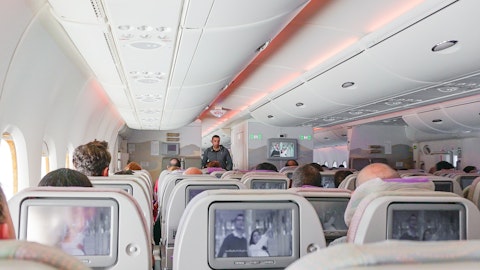Nicolas Finazzo: You know, it’s probably will be slower with a large airline because more pilots that have to be trained with a smaller airline, they actually could do flight training in the airplane. It’s expensive. But for a small airline, it may not make sense for them to pay to have a simulator modified with our system. So we don’t know the answer to that yet. That’s going to depend on whether — or how many airplanes does the airline have, and can they justify the cost of modifying a simulator. And whether a simulator operator would be willing to modify their simulator. So if you’re going to do, and if you recall when we did flight training for the FAA, during our flight testing, we took five pilots who had never received training on our Enhanced Flight Vision system.
We put them through a ground school, and we actually took them in the airplane and did flight testing in the airplane and trained them in the airplane. Now, that’s expensive, but we were able to do that successfully with those five pilots.
Gautam Khanna: Got you. Okay. And just to follow up on some of your earlier comments on the increased documentation standards of maintenance history, and the like. Have there been any — is it obtainable? I mean, I just wonder, like is there — is it one of those things where it’s just a matter of time to dot the I’s and cross the t’s, or is it — I’m just curious, like, it’s something different where it’s just much harder to even obtain the information. And that might extend when these assets are actually available for sale if you will.
Nicolas Finazzo: The information is generally available. If you can get somebody to go through their archives, go through their records archives and pull the data. And what’s really frustrating is when we go to buy an airplane or an engine and it’s been in the hands of multiple airlines and the airline still exists and it has records, or we have the records. And there are some gaps in the paperwork, whether it would be a non-incident statement or back-to-birth traceability on an LLP Life Limited Part. And we go back to the airline, would say, hey, would you guys, this is what we need you to sign. And they just say, no, guys we’re busy doing other things. And we sold this airplane a long time ago, and no, we’re not going to fix it.
Now, you’ve got a gap in the records that for most customers, they won’t buy it. Some will, because it wasn’t — some of these are not even regulatory requirements, they’re just requirements that the industry has imposed to make the records impeccable, perfect. No gaps, no questions. And — but it’s also very frustrating. So I believe that all the records can be fixed if you get cooperation from the various parties who operated the flight equipment. And we’ve been successful for the most part. I mean, rarely do we have something that we say, we give up. And by the way, and when we’re doing our pricing, if we see an engine that has or whatever aircraft landing gear that doesn’t meet the standards, and we look at it and we say, there is no way we can fix that.
Then we adjust the price, we say, okay, look, these parts aren’t going to trace, they’re not sellable. So I’m not going to — you want those parts back? I’ll give you those parts back when we take the engine apart, but I’m not paying for them. And we’ve done that where we’ve not paid for parts that don’t have life-limited traceability. And I don’t know what they do with them because if you don’t have the paperwork that goes with them, the parts are just — they’re scrap metal.
Gautam Khanna: That’s a helpful answer. I appreciate it. And I may have missed this if you did address it, but can you remind us how many 757 aircraft you still have kind of in the hopper to potentially monetize? And where we are in some of those? Which negotiations are closer at hand and which are a little further out?
Nicolas Finazzo: Yeah. I wish I would — I could report that we were in great shape on the 757, as far as customer demand. Right now, the cargo market continues to be very soft. There seems to be more available aircraft than the cargo operators need at this point, and that applies to the 757. We do have seven airplanes that are uncommitted at this point. We are talking to airlines for both the lease and potential sale, including customers that we’ve already sold aircraft too. But nothing is, we have no contracts at this point on those airplanes. And that’s another very difficult thing to project for the balance of this year because I don’t have any real strong understanding of where the freight market will be, as the balance of this year unfolds.
So at this point, seven airplanes either have been converted or finishing conversion. We’re looking for homes for them in a tough market. The market will recover and those airplanes will be viable again for leasing and sale. And we’re going to have to wait it out.
Operator: Thank you. The next question comes from Ken Herbert of RBC Capital Markets. Please go ahead.
Kenneth Herbert: Hey, good afternoon, Nick and Martin.
Martin Garmendia: Good afternoon, Ken.
Nicolas Finazzo: Hi, Ken.



